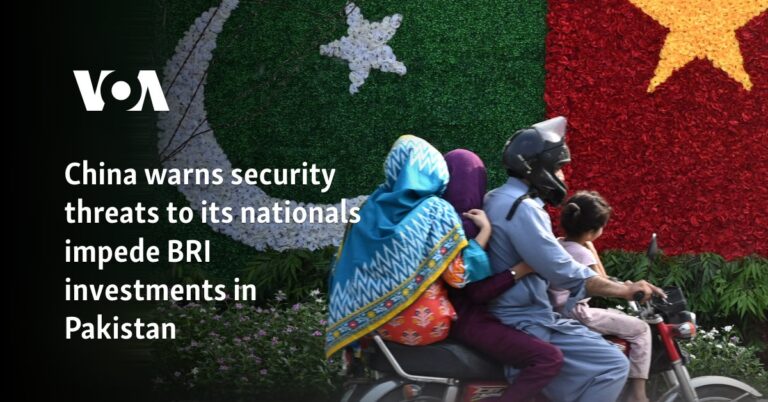China has increased diplomatic pressure on close ally Pakistan to take action against militants responsible for repeated attacks on Chinese workers, calling the violence “unacceptable”. , warned that it poses “constraints” on Chinese government investment under the Belt and Road Initiative (BRI).
The unusual public warning accusing Islamabad of consistent security lapses regarding Chinese workers was issued by Beijing’s ambassador to China, Chiang Zaidong, while speaking at a seminar in Islamabad this week. Analysts said the comments reflected China’s growing frustration with the security risks facing workers in the South Asian country.
Jiang was referring to suicide car bombings in March and October of this year, which resulted in the deaths of seven Chinese military personnel. The number of Chinese workers killed in Pakistan has risen to 21 since Pakistan launched a major bilateral connectivity project as part of the Belt and Road Initiative nearly a decade ago.
“It is unacceptable to be attacked twice in just six months,” a Chinese diplomat said through an interpreter, adding that Islamabad is “effective in preventing the recurrence of such acts of terrorism and ensuring the safety of the perpetrators.” It is necessary to take corrective measures.” be identified, captured, and punished. ”
Considered the flagship project of the Belt and Road, the China-Pakistan Economic Corridor (CPEC) will bring in more than $25 billion in Chinese investment to strengthen Pakistan’s infrastructure, improve bilateral trade and expand the wider South Asian region. is promoting further integration.
Jiang said security is the “biggest concern” for the Chinese government and a “constraint on the CPEC project” and called on Pakistan to take action against “all anti-China terrorist groups.” He added: “Nothing can be accomplished without a safe and healthy environment.”
CPEC has built roads, highways, mainly around coal-fired power plants, and the strategic deep-sea Gwadar port on the Arabian Sea in the country’s southwestern Balochistan province.
Pakistan’s Foreign Minister Ishaq Dar, speaking at a seminar on Tuesday organized by the Islamabad-based independent Pakistan-China Institute, told the Chinese ambassador that Pakistan was taking action against terrorists and that Chinese He made it clear that he is strengthening security.
Dar said Pakistan will share progress with China at high-level talks next month.
“The Chinese are very clear: No matter how lucrative the investment is, if there are security issues, they will not send Chinese people to the country. Your country is the only exception,” he said. He told the audience, quoting his words to the Pakistani side at the meeting.
Critics argue that Pakistan’s financial difficulties and political instability are preventing new Chinese investment in CPEC.
Washington-based South Asia expert Michael Kugelman told VOA that Beijing’s security concerns are making it difficult for the megaproject to regain momentum quickly. .
“When a Chinese envoy publicly accuses Pakistan of not providing adequate security, you know there’s a big problem,” said Kugelman, director of the Wilson Center’s South Asia Institute.
“Going forward, the goal will be to be cautious in maintaining and promoting existing projects, while being cautious in agreeing to new projects until China eases concerns about security risks,” he added.
After the launch of the CPEC project, the Pakistan Army has formed a specially trained force of over 13,000 troops to protect these efforts across the country. However, attacks on Chinese nationals have raised concerns about the effectiveness of this military force.
Hasnain Javed, a Pakistani foreign researcher based in Beijing, pointed out that China had never publicly criticized Islamabad before.
“This is a strong rebuttal and a serious complaint about the insecurity around CPEC,” Javed told VOA in written comments. “Currently, the Chinese seem to have little patience, especially since the military is the main guarantor when it comes to security.”
Most recent attacks on Chinese workers and technicians have been claimed by the Baloch Liberation Army (BLA), a prominent separatist group that carries out insurgent attacks in Balochistan province.
The group, made up of militants from the Baloch ethnic minority, accuses China of helping Pakistan exploit the province’s natural resources and calls on Beijing to withdraw CPEC and other investments. There is.
Both countries reject this claim, saying the Baloch rebels are on a mission to disrupt the poor province’s development and undermine Pakistan’s close ties with China.
The BLA, designated a global terrorist organization by the United States, has recently escalated its guerrilla attacks in Balochistan province, killing hundreds of Pakistanis, mostly members of the security forces, in recent months.
During his visit to Pakistan in early October, Chinese Premier Li Qiang also emphasized the importance of security in economic development and cooperation.
In a joint statement after the visit, the Chinese side reportedly stressed the “need and urgency to take targeted security measures in Pakistan to jointly create a safe environment for cooperation between the two countries.” There is.



